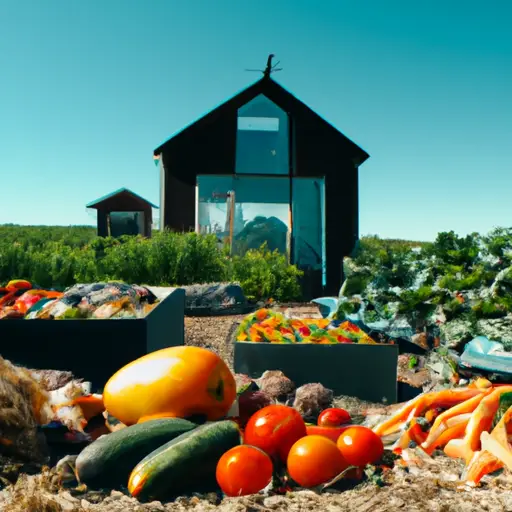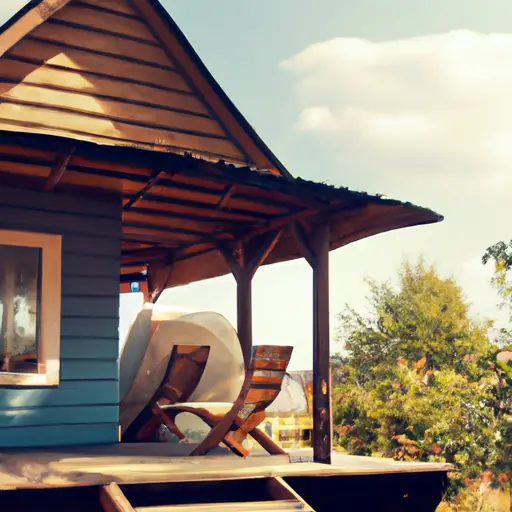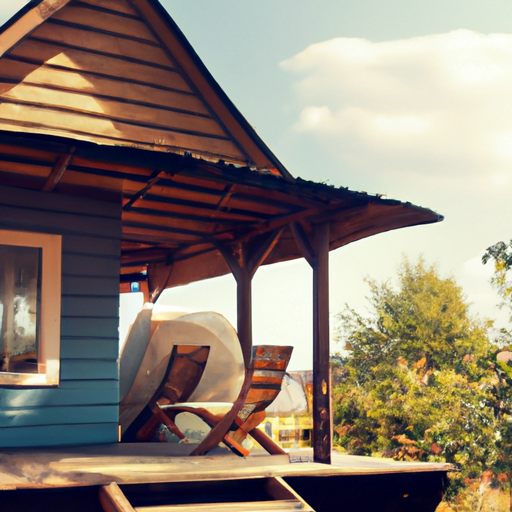Have you ever dreamt of living off the grid? Away from the hustle and bustle of city life, relying on sustainable resources, and embracing a more self-sufficient lifestyle? If so, you’re not alone. Many individuals yearn for the freedom and simplicity that comes with off-grid living. But where, you may wonder, can you find the perfect off-grid community in Europe?
Europe offers a plethora of options for those seeking an off-grid lifestyle. From secluded rural areas to vibrant eco-villages, there is something for everyone. In countries like Portugal, Spain, and Italy, you can find communities that have embraced renewable energy sources, organic farming, and communal living. These communities often prioritize sustainable practices and aim to create harmonious relationships with nature.
In this article, we will explore some of the top off-grid communities in Europe, discussing their unique features, values, and amenities. Whether you’re interested in becoming part of a close-knit community or prefer a more secluded lifestyle, we will guide you through the different options available. So, if you’re ready to embark on this exciting journey towards off-grid living, keep reading to find the perfect community that aligns with your aspirations and values.

Introduction
Living off the grid has become increasingly popular in recent years as people seek to regain control over their lives, reduce their environmental impact, and embrace self-sufficiency. Europe, with its diverse landscapes and progressive mindset, offers numerous off-grid communities that provide a sustainable and fulfilling lifestyle. In this article, we will explore the concept of off-grid living, the benefits and challenges it presents, factors to consider when choosing an off-grid community, and some of the top off-grid communities in Europe. Whether you are a nature enthusiast, an environmentalist, or simply someone looking for a change of pace, this guide will help you find the perfect off-grid community in Europe.
Understanding Off-Grid Living
What is off-grid living?
Off-grid living refers to a lifestyle where individuals or communities are disconnected from public utility services such as electricity, water, and gas. Instead, they generate their own power through renewable energy sources like solar panels or wind turbines, collect rainwater for their water needs, and utilize sustainable farming practices to grow their own food. Off-grid living encourages self-sufficiency and a reduced reliance on external resources, promoting a more sustainable and eco-friendly way of life.
Benefits of off-grid living
Living off the grid offers numerous benefits. Firstly, it allows individuals to regain their independence and reduce their dependence on the external grid. This provides a sense of freedom and self-reliance that is often lacking in urban settings. Additionally, off-grid living promotes a smaller carbon footprint as renewable energy sources are utilized, leading to a more environmentally friendly lifestyle. Moreover, off-grid communities often foster a strong sense of community and cooperation among residents, creating a supportive and close-knit environment. Finally, living off the grid allows individuals to reconnect with nature, providing a peaceful and serene living experience.
Challenges of off-grid living
While off-grid living has its advantages, it also presents several challenges. Adapting to a self-sufficient lifestyle requires significant adjustments and learning new skills. It may take time to establish efficient systems for generating power, conserving water, and managing waste. Social isolation can also be a challenge, especially for those accustomed to a more vibrant urban lifestyle. Furthermore, the initial setup costs of off-grid living, such as purchasing renewable energy systems and installing necessary infrastructure, can be expensive. It is important to carefully consider these challenges before embarking on an off-grid lifestyle.

Factors to Consider for Choosing an Off-Grid Community
When deciding on an off-grid community to join, it is essential to consider various factors that will contribute to your overall experience and satisfaction. Here are some key factors to keep in mind:
Location and Climate
The location and climate of an off-grid community play a crucial role in determining its suitability for your needs. Consider the climate conditions and seasonal changes to ensure they align with your preferences and requirements. Additionally, assess the accessibility of the location and the availability of essential services in the nearby area.
Access to Natural Resources
A key aspect of off-grid living is the utilization of natural resources. Evaluate the availability of resources such as water, sunlight, and fertile land for farming. These resources are essential for self-sufficiency and will directly impact your ability to thrive in an off-grid community.
Community Size and Demographics
Consider the size of the off-grid community and its demographics. Some individuals prefer smaller, tight-knit communities, while others thrive in larger, more diverse communities. Assessing community demographics will help you determine if it aligns with your values and interests.
Sustainability Initiatives
Investigate the sustainability initiatives of the off-grid community you are considering. Look for communities that prioritize environmentally friendly practices, such as sustainable farming, waste management, and renewable energy production. These initiatives reflect a commitment to long-term sustainability and can contribute to a healthier and more thriving community.
Cost of Living
Evaluate the cost of living in the off-grid community. Consider the expenses associated with purchasing or renting land, installing renewable energy systems, and maintaining the necessary infrastructure. It is important to ensure that the cost of living is sustainable for your financial situation.
Infrastructure and Amenities
Assess the infrastructure and amenities available in the community. Consider factors such as access to clean water, electricity, and waste management systems. Additionally, consider the availability of amenities such as schools, healthcare facilities, and recreational spaces. These factors will contribute to your overall comfort and well-being in the off-grid community.
Regulations and Permits
Review the local regulations and permits required for off-grid living in the community you are considering. Ensure that the community is legally compliant and that you understand any restrictions or requirements that may affect your lifestyle.
Connectivity
Consider the connectivity options available in the off-grid community. While living off the grid often implies a reduced reliance on technology, it is important to assess the availability of internet and communication services. This is particularly important if you require connectivity for work or other responsibilities.
Healthcare and Emergency Services
Evaluate the accessibility of healthcare facilities and emergency services in the off-grid community. Consider the proximity to hospitals and medical professionals to ensure that your healthcare needs can be adequately met. It is also crucial to assess emergency response systems and procedures within the community.
Top Off-Grid Communities in Europe
Europe is home to several exceptional off-grid communities that exemplify sustainable living. Here are some of the top off-grid communities in Europe:
EcoVillage Sieben Linden, Germany
EcoVillage Sieben Linden is a well-established off-grid community in Germany. It focuses on ecological construction, renewable energy production, organic farming, and sustainable living. The community offers educational programs and a vibrant cultural scene, fostering a holistic and sustainable lifestyle.
Molino de Guadalmesí, Spain
Located in Andalusia, Spain, Molino de Guadalmesí is an off-grid eco-village known for its commitment to sustainable living. The community emphasizes permaculture, sustainable agriculture, and renewable energy production. It offers a serene and scenic environment for those seeking a peaceful off-grid lifestyle.
Änggärdet, Sweden
Änggärdet is a self-sufficient off-grid community situated in the heart of Sweden’s forests. This community focuses on sustainable living, eco-friendly construction, organic farming, and renewable energy production. Änggärdet offers a strong sense of community and an abundance of natural beauty.
Portugal Ecovillage, Portugal
Portugal Ecovillage is an off-grid community located in the picturesque Alentejo region of Portugal. The community prioritizes sustainability through permaculture, organic farming, and renewable energy solutions. Portugal Ecovillage offers an inclusive and supportive environment for individuals seeking an off-grid lifestyle.
Lammas Ecovillage, Wales
Lammas Ecovillage is situated in the rural landscapes of Pembrokeshire, Wales. It is renowned for its focus on sustainable farming, renewable energy generation, natural building methods, and ecological conservation. Lammas Ecovillage provides an ideal setting for individuals looking to connect with nature and live off the grid.
Dordogne Ecovillage, France
Dordogne Ecovillage is a thriving off-grid community in the beautiful French countryside. The community emphasizes sustainable agriculture, renewable energy production, and ecological preservation. Dordogne Ecovillage offers a mix of traditional and innovative off-grid living practices.
La Junquera, Spain
Located in the Sierra de Gredos mountain range, La Junquera is an off-grid community in Spain. The community focuses on sustainable practices, including organic farming, renewable energy generation, and eco-friendly construction. La Junquera offers a tranquil and scenic setting for individuals seeking an off-grid lifestyle.
Schloss Tempelhof, Germany
Schloss Tempelhof is a sustainable off-grid community in Germany that occupies a historic castle. The community excels in regenerative agriculture, renewable energy production, and ecological restoration. Schloss Tempelhof provides a unique off-grid experience within a historic and picturesque environment.
Tamera Peace Research & Education Center, Portugal
Tamera Peace Research & Education Center, located in Portugal, is an off-grid community dedicated to peace research, water sustainability, and regenerative agriculture. The community emphasizes the importance of sustainable living and offers educational programs and workshops.
Casa da Cachoeira, Brazil
While not in Europe, Casa da Cachoeira in Brazil is worth mentioning due to its exceptional off-grid community. Situated in the rainforest, Casa da Cachoeira focuses on ecological preservation, organic farming, and renewable energy production. It offers a unique off-grid experience amidst the lush and biodiverse environment of the Brazilian jungle.
Factors that Differentiate Off-Grid Communities
Off-grid communities vary in their approaches and priorities. Here are some factors that differentiate these communities:
Self-sufficiency levels
Off-grid communities differ in their level of self-sufficiency. Some communities may rely heavily on external resources, while others prioritize producing their own food, energy, and water.
Sustainable farming practices
The approach to farming varies among off-grid communities. Some communities prioritize organic farming, permaculture, and regenerative practices, while others may focus on traditional or innovative farming methods.
Renewable energy sources
The choice of renewable energy sources varies among off-grid communities. Some prioritize solar energy, while others may utilize wind, hydro, or a combination of renewable sources.
Community governance models
Off-grid communities adopt different governance models to facilitate decision-making and community management. Some communities may operate with a democratic approach, while others may have a designated leader or governing committee.
Innovative technologies
Some off-grid communities strive to incorporate innovative technologies that enhance sustainability and self-sufficiency. These technologies range from advanced systems for renewable energy generation to cutting-edge water and waste management solutions.
Educational and skill-sharing opportunities
Off-grid communities often emphasize education and skill-sharing. They may offer workshops, courses, and practical training in areas such as sustainable farming, renewable energy production, and ecological conservation.
Focus on environmental conservation
While all off-grid communities prioritize sustainability, some place a stronger emphasis on ecological conservation. These communities actively work towards preserving biodiversity, rewilding landscapes, and protecting natural resources.
Inclusive and diverse communities
Off-grid communities vary in their inclusivity and diversity. Some cultivate a diverse community, welcoming individuals from various backgrounds and cultures, while others may prioritize specific values or lifestyles.
Artistic and cultural initiatives
Many off-grid communities foster artistic and cultural initiatives as a means of creativity and expression. These communities often offer spaces for artistic endeavors, such as studios and galleries, and organize cultural events.
Community support and cooperation
The level of community support and cooperation within off-grid communities can differ. Some communities have a strong sense of mutual aid and collaboration, while others may have a more independent and self-reliant approach.
Challenges and Considerations
While off-grid living can be fulfilling, there are challenges and considerations to keep in mind. These include:
Adapting to self-sufficiency
Transitioning to self-sufficiency can be challenging, especially for individuals accustomed to a more dependent lifestyle. Learning new skills and adjusting to sustainable practices may require time and effort.
Social isolation
Off-grid living can sometimes lead to social isolation, particularly if the community is located in a remote area. Consider your need for social interaction and assess the community’s ability to provide a supportive and engaging environment.
Initial setup costs
The initial costs associated with off-grid living can be substantial. These costs include purchasing or renting suitable land, installing renewable energy systems, and establishing necessary infrastructure. Carefully assess your finances and budget accordingly.
Legal and regulatory hurdles
Off-grid living may entail navigating legal and regulatory hurdles. Ensure that you are familiar with local laws and regulations regarding zoning, building codes, and land use. Consult legal professionals if necessary.
Maintenance and repairs
Living off the grid requires ongoing maintenance and repairs of infrastructure and systems. Consider the time, effort, and skills required to maintain a self-sufficient lifestyle.
Access to healthcare and emergency services
The availability of healthcare and emergency services may vary in off-grid communities, particularly in remote areas. It is essential to assess the proximity of medical facilities and emergency response services to ensure your well-being and safety.
Educational options for children
If you have children, consider the educational options available within the off-grid community. Assess whether the community offers homeschooling opportunities, educational programs, or access to nearby schools.
Resilience during crises
Off-grid communities must be prepared for emergencies and crises. Consider the community’s ability to withstand and respond to natural disasters, economic downturns, and other unforeseen circumstances.
Weather and natural disaster risks
Evaluate the weather conditions and natural disaster risks in the area where the off-grid community is located. Some areas may be prone to extreme weather events, such as floods or wildfires. Assess the impact these risks may have on your safety and well-being.
Long-term sustainability
Consider the long-term sustainability of the off-grid community. Assess the community’s ability to adapt, evolve, and remain self-sufficient over time. This includes considering the community’s approach to ecological conservation, resource management, and community development.
Tips for Finding the Perfect Off-Grid Community
Finding the perfect off-grid community requires careful consideration. Here are some tips to help you find the right fit:
Define your priorities and values
Reflect on your personal priorities and values. Determine what is most important to you in an off-grid community, such as sustainability, community support, or access to certain amenities.
Engage with existing community members
Connect with members of the off-grid community you are considering. Seek their insights and perspectives on the community’s strengths, challenges, and overall livability. Engaging with community members will provide valuable firsthand information.
Visit and spend time at potential communities
Whenever possible, visit potential off-grid communities and spend time immersing yourself in their environment. Participate in community events, explore the surroundings, and get a feel for the community’s atmosphere.
Research online platforms and forums
Utilize online platforms and forums dedicated to off-grid living. Engage in discussions, read reviews, and seek advice from individuals who have experience with off-grid communities. These platforms can provide valuable information and insights.
Consider trial periods or short-term stays
Some off-grid communities offer trial periods or short-term stays to allow you to experience the lifestyle firsthand. Consider taking advantage of these opportunities to assess whether a particular community is right for you.
Seek advice from off-grid living experts
Consult with experts in off-grid living, such as sustainable living consultants or permaculture practitioners. These professionals can provide guidance and help you navigate the complexities of off-grid living.
Evaluate affordability and feasibility
Carefully evaluate the affordability and feasibility of living in a specific off-grid community. Consider the costs associated with acquiring land, installing renewable energy systems, and maintaining the necessary infrastructure. Ensure that the community is financially viable for your situation.
Trust your instincts and intuition
Listen to your instincts and intuition when deciding on an off-grid community. Pay attention to how you feel when visiting or interacting with the community. Trusting your gut feeling can guide you towards the right choice.
Plan for contingencies
Be prepared for contingencies and potential challenges that may arise. Have a backup plan in case circumstances change or the community does not meet your expectations. Consider alternative off-grid communities or other options that align with your values.
Embrace the learning journey
Living off the grid requires continuous learning and growth. Embrace the journey of acquiring new skills, adapting to new ways of living, and cultivating resilience. Embrace the challenges and rewards that come with the off-grid lifestyle.
Conclusion
Finding the perfect off-grid community in Europe is an exciting journey that offers the opportunity for sustainable living, self-sufficiency, and connection with nature. By understanding the concept of off-grid living, considering key factors when choosing a community, and exploring the top off-grid communities in Europe, you can make an informed decision that aligns with your values and desires. Remember to evaluate the challenges and considerations, take into account the factors that differentiate off-grid communities, and follow the tips for finding the perfect off-grid community. By doing so, you can embark on a fulfilling and rewarding off-grid lifestyle in Europe.




